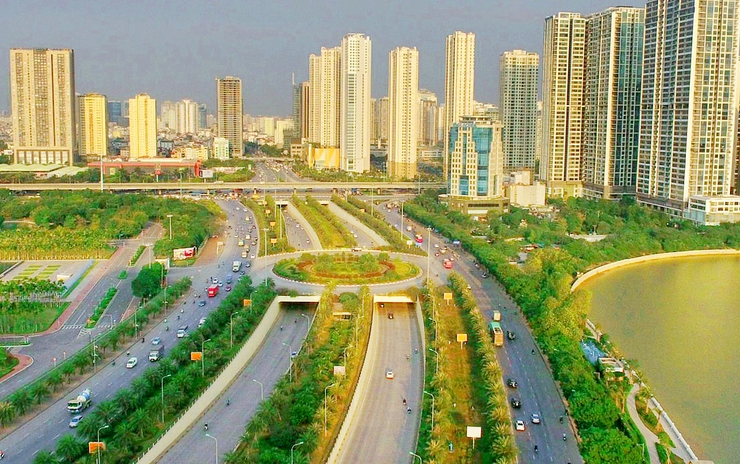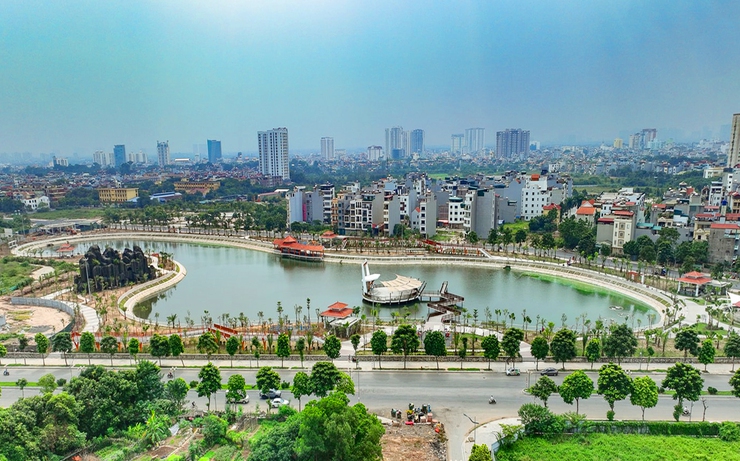These efforts contribute to successfully implementing the Resolution of the 13th National Party Congress and the 17th Hanoi Party Congress.

Hanoi from above.
Entering a new era of national growth, Hanoi aims for an economic growth rate of over 8% by 2025. The municipal Party Committee's Program No. 03-CTr/TU on "Urban Renovation, Urban Development, and Urban Economy for the 2021-2025 Period" is a distinctive initiative, aligning with other programs on planning, land management, and public investment.
This year, numerous key projects are underway, including major bridges over the Red River, the To Lich River environmental improvement project, and the renovation of public spaces around Hoan Kiem Lake. These efforts will gradually transform the capital into a sustainable, modern, and civilized city, contributing to the successful implementation of the 13th National Congress of the Communist Party and the 17th Congress of the Hanoi Party Committee.
As the capital and the nation's political-administrative center, Hanoi is a special urban area and a major hub for economics, culture, education, science, technology, and international integration. The resolutions of the 17th Party Congress and its action program have identified a key task: "Enhancing the quality and efficiency of urban renovation, development, and modernization in conjunction with sustainable urban economic growth." A breakthrough priority is "accelerating the modernization and synchronized development of economic and social infrastructure, constructing landmark structures, and creating distinctive urban architectural spaces that reflect the capital's unique character." There is also a strong focus on developing transportation infrastructure to connect the city center with suburban areas, satellite cities, and neighboring provinces within the Hanoi Capital Region.
To achieve these objectives, the Party Committee has introduced 10 key programs, including Program No. 03 on "Urban Renovation, Urban Development, and Urban Economy for the 2021-2025 Period." Unlike previous terms, this program not only focuses on urban renovation and development but also emphasizes green, smart, and modern urban economic growth.

Ngoc Thuy Park.
After nearly five years of implementation, under the decisive leadership of the Party Committee, the People's Council, and the People's Committee, along with the collective efforts of departments, districts, and the entire population, the program has achieved remarkable results. Many significant projects have been completed, reshaping the city's landscape. Notably, 62 parks and flower gardens have been built or renovated, exceeding the initial target by 137.7%. Key projects include Ngoc Thuy Park, Long Bien Park, Lam Ha Park, CV1 Reservoir Park, Mai Dich Park, the Astronomy Park in Ha Dong, the Music Park in Ha Dong, Me Tri Park in Nam Tu Liem, and Phung Khoang Park.
Additionally, Hanoi has renovated major parks such as Thong Nhat Park and Tuoi Tre Park, integrating them with pedestrian spaces to enhance public accessibility and green living. The city has also expanded five pedestrian streets, surpassing targets and creating new cultural and tourism spaces.
Alongside the expansion of public spaces, significant progress has been made in upgrading sidewalks, roads, and urban technical infrastructure. So far, 256 streets have been renovated, exceeding the planned target by 42%. The underground installation of telecommunications and power cables on several main roads has improved the city's appearance, making it more modern and organized.
Efforts to preserve and renovate historic architectural landmarks have also achieved significant progress. By the end of 2025, Hanoi expects to complete the restoration of 36 villas and 15 notable structures built before 1954. Some key projects include the French colonial villa at 49 Tran Hung Dao - 46 Hang Bai, the Hoan Kiem District Police Headquarters at 2 Trang Thi, and historic villas at 68 Nguyen Thai Hoc and 180 Quan Thanh.
Beyond urban renovation, Hanoi is prioritizing environmental improvement and enhancing residents' quality of life. Currently, 100% of urban households and 95% of rural households have access to clean water. Urban wastewater treatment has reached 40.8% and is expected to increase to 50% by the end of 2025, with the Yen Xa wastewater treatment system becoming operational.
The city has also invested in the construction of numerous new urban areas and smart urban centers, integrating commercial facilities. Notable completed projects include the Tay Mo - Dai Mo urban area (Nam Tu Liem), the Financial Center Tower, and five major shopping centers: Vincom Mega Mall Ocean Park (Gia Lam), Vincom Smart City (Nam Tu Liem), Lotte Mall (Tay Ho), ParkCity (Ha Dong), and Diamond Plaza (Thanh Xuan).
Additionally, Hanoi has exceeded its target by constructing 25 new markets, with 14 currently under construction and 24 in the planning stage. A key priority is the development of modern and integrated transportation infrastructure. Several major projects have been completed and are operational, easing traffic congestion. These include the Nhon - Hanoi railway line, the Le Van Luong - Ring Road 3 underpass, the Chua Boc - Pham Ngoc Thach overpass, the Au Co road section from Thang Loi Hotel to Nhat Tan Bridge, and Vinh Tuy Bridge Phase 2.
The city is also accelerating the construction of Ring Road 4 within the Capital Region and preparing to invest in crucial road connections, such as linking Phap Van - Cau Gie with Ring Road 3. Hanoi is expediting investment procedures for key projects like urban railway lines, major Red River bridges (Tu Lien, Tran Hung Dao, Ngoc Hoi, Hong Ha, Me So, and Hoai Thuong), and waste and wastewater treatment projects to improve environmental conditions.
Under the direction of the Party Committee and coordination with the Steering Committees of Hanoi's action programs, the Steering Committee for Program No. 03-CTr/TU has played a key role in refining urban planning frameworks, developing regulatory mechanisms, and introducing groundbreaking policies. These efforts include submitting two Capital Region plans for approval by the Prime Minister and presenting the amended Capital Law to the National Assembly, introducing special policies to advance urban renovation, development, and reconstruction.
With its ambitious vision, Hanoi is firmly advancing towards a sustainable, modern, and dynamic future, ensuring the city remains a leading force in the nation's development.